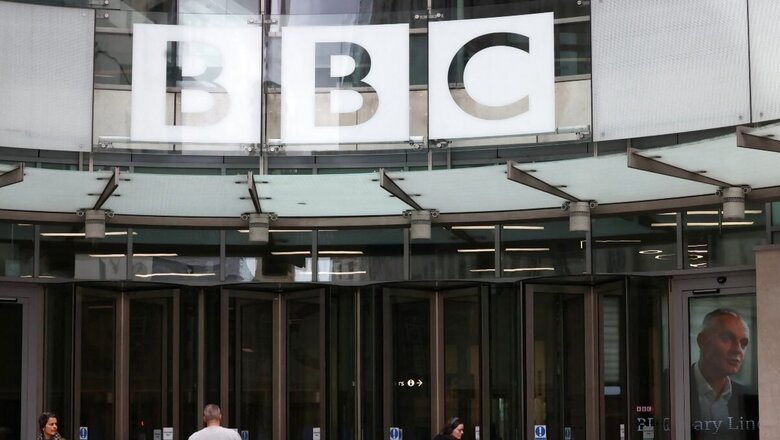
views
“Let me stop you right there!” thundered Irfan Ali, the President of Guyana, at BBC interviewer Stephen Sackur. The Hard Talk host had tried to lecture President Ali on carbon emissions from Guyana’s newfound oil reserves worth $150 billion in the next decade or two. Stating that his country does more than enough forest conservation for which it is not paid or given credit while the developed world enjoyed the fruits of energy since the industrial revolution, he asked the BBC interviewer point blank: “Are you in the pockets of those who damaged the environment?”
This interview instantly went viral. From every corner of the world, praise poured in for Ali, who embodied the voice of the Global South. But more strident than the support was the sheer anger and disgust towards the BBC’s hypocrisy, its chastising coloniser tone, and what seemed to be its advocacy for the globalist elite and invested interests.
In a multipolar world, the BBC — as also a handful of Western media outlets like The New York Times, The Washington Post, Financial Times, or Deutsche Welle —has squarely sided with powerful Left-leaning, globalist networks which want to weaken every government unwilling to do their bidding.
By its over-bias, the BBC violates the first premise of Britain’s Royal Charter which defines its ‘Public Purposes’: “To provide impartial news and information to help people understand and engage with the world around them: the BBC should provide duly accurate and impartial news, current affairs and factual programming to build people’s understanding of all parts of the United Kingdom and of the wider world.”
The BBC has long failed to convince the world that it is spending British taxpayers’ money to provide “impartial news and information”. The Conservative Party of the UK has long called out its strong pro-Labour, pro-Left leaning. Tory MP Peter Bruinvels famously called it the Bolshevik Broadcasting Corporation.
Then PM Margaret Thatcher said: “I have fought three elections against the BBC and don’t want to fight another against it.” Indarjit Singh, the chief of Britain’s Network of Sikh Organisations, said: “Stations like BBC Asian Network do little to encourage integration and social cohesion because they allow communities to ghettoise themselves.”
In October 2019, Singh quit ‘Thought for the Day’ on BBC Radio 4, exposing BBC’s “misplaced sense of political correctness”. The BBC stopped the broadcast of a show commemorating Sikh Guru Tegh Bahadur, who had been beheaded for opposing the forced conversion of Hindus to Islam in India in the 17th century, “because it might offend Muslims”.
Russia banned the BBC in 2022 accusing it of circulating fake news on the war against Ukraine. China has banned the BBC too. The Beeb has been accused of deep-seated bias against Israel in its coverage of the Palestinian conflict.
In India, the BBC’s list of transgressions is long. It has always been seen as pro-Pakistan, a stand consistent with Labour’s.
Recently, the BBC was found guilty of tax evasion. After initially trying to make it seem like vengeance by the Indian government, the BBC admitted that it underreported Rs 40 crore ($4.8 million) of income in its tax returns. It followed a suspiciously timed documentary in the run-up to the 2024 elections called ‘India: The Modi Question’. The documentary, through a slew of opinions and innuendo, raked up the 2002 Gujarat riots and tried to implicate then Gujarat CM and now PM Narendra Modi, whom courts had exonerated a decade ago.
“This is politics at play by people who do not have the courage to come into the political field. They want to have that Teflon cover saying that I am an NGO, media organisation etc. They are playing politics,” said Indian external affairs minister S Jaishankar about the film. “Look who the cheerleaders are. What is happening is, just like I told you — this drip, drip, drip — how do you shape a very extremist image of India, of the government, of the BJP, of the Prime Minister? This has been going on for a decade.”
Whether it is the anti-CAA protests or farmers’ agitation, abrogation of Article 370 in Kashmir or Ram Mandir pran pratistha, Leicester riots or the hijab-in-schools controversy, the BBC has consistently taken anti-India, anti-Hindu positions. All this begs the question: is the BBC doing the once-Great Britain a great disservice?
The answer is pretty clear.
The BBC undermines the UK’s economy, security, law and order, and demographic destiny by consistently taking a Left-tainted, pro-immigrant stance. It pussyfoots on Islamic radicalisation and terror.
But more importantly, it is damaging Britain’s image in a multipolar world by pissing off potential allies and coming across as the UK’s entitled and sanctimonious attack dog. The BBC cannot claim to be independent of Britain nor can Britain shake off the BBC baggage in foreign relations, especially when there is no wall of solid, impartial journalism to separate the two.
Abhijit Majumder is a senior journalist. Views expressed in the above piece are personal and solely those of the author. They do not necessarily reflect News18’s views.


















Comments
0 comment